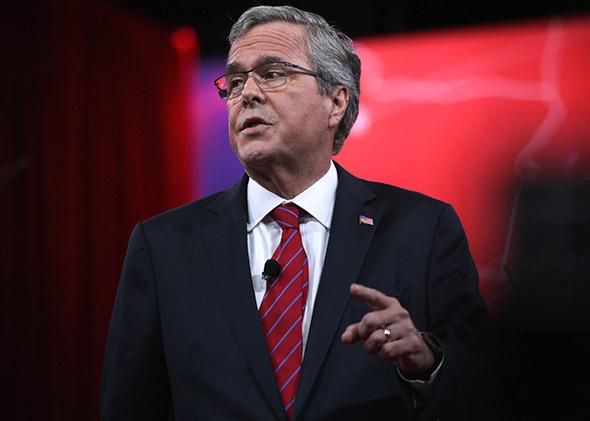In the five days since he signed Indiana’s Religious Freedom Restoration Act, a cadre of athletes, activists, and business leaders have condemned and criticized Gov. Mike Pence for ostensibly giving state sanction to anti-gay discrimination. Typical is Apple CEO Tim Cook’s admonition in the Washington Post: “These bills rationalize injustice by pretending to defend something many of us hold dear. They go against the very principles our nation was founded on, and they have the potential to undo decades of progress toward greater equality.”
Whether that’s true is up for debate. Opponents say that by extending religious protections to businesses in lawsuits against private parties, the state gives cover to those who want to discriminate against same-sex couples, like the photographers and wedding bakers who inspired the measure. Proponents say that this is nonsense, and that the law is just an update to federal measures that protect individuals from undue burdens on their religious faith.
Reasonable people can disagree on what the law means. But it’s undeniable that political currents have moved away from proponents, threatening Indiana’s standing as well as Pence and his administration. It’s why, on Tuesday, the governor held a press conference where he asked Republican lawmakers to give him a bill that would “fix” the law, making it clear that “this law does not give businesses the right to deny services to anyone.” He didn’t specify the kind of language he wants, but he did restate his support—“This is about restraining government overreach”—and said he was “grateful” to those who defended Indiana and the law.
Standing in solidarity with Pence are Republican presidential candidates, who—more than the governor with his proposed “fix”—are wading against the stream of public opinion.
The first GOP hopeful to defend Pence was Jeb Bush, the would-be consensus candidate who scores a real win by beating Sens. Ted Cruz and Rand Paul—the two men most clearly vying for conservative religious voters—to the punch. “I think Gov. Pence has done the right thing,” said Bush in an interview with Hugh Hewitt, an influential conservative radio host. “I think once the facts are established, people aren’t going to see this as discriminatory at all.”
A few hours later, Cruz also piped up for Pence. “Gov. Pence is holding the line to protect religious liberty in the Hoosier State,” he said. “Indiana is giving voice to millions of courageous conservatives across this country who are deeply concerned about the ongoing attacks upon our personal liberties.” Rubio denied that religious freedom laws were about discrimination—“Nobody is saying that it should be legal to deny someone service at a restaurant or at a hotel because of their sexual orientation”—while Ben Carson called such laws “absolutely vital,” and both Rick Santorum and Rick Perry have tweeted their support of the Indiana governor.
Neither Wisconsin Gov. Scott Walker nor Sen. Rand Paul nor Mike Huckabee has said anything public, but it’s safe to assume that they—and other prospects like Ohio Gov. John Kasich and Louisiana Gov. Bobby Jindal—stand with the rest of the field. If religious freedom wasn’t a core issue in the Republican presidential primary, it is now, to the point that National Review has pre-emptively disqualified Pence from the nomination for walking back in the face of criticism. “This is craven capitulation,” writes Quin Hillyer of Pence’s call for clarification, declaring the governor “unworthy of the presidency.” At this rate it won’t be a shock if the eventual nominee endorses an update to the federal RFRA, aligning it with Indiana’s measure and broadening its protections of religious practice.
Put differently, this entire affair is a solid win for social conservatives, who now have inadvertently arrived at a broad commitment to an important priority. No one in the Republican presidential field will buck the consensus on religious freedom, and given the extent to which hopefuls like Cruz and Jindal will need to flank Bush from his right, there’s a good chance the party position on religious freedom will move further to the right.
Republican modernizers aren’t so lucky. “Religious freedom” antagonizes traditionally Democratic groups as much as it mobilizes conservative voters. The backlash to the Indiana law is instructive. In a new poll from the Pew Research Center, 62 percent of young people, 61 percent of black Americans, and 56 percent of Latinos say that wedding-related businesses should have to provide services to same-sex couples. (What’s interesting is that 59 percent of black Protestants agree, even as most oppose gay marriage. Perhaps possible discrimination is more salient to these respondents than the morality of same-sex weddings.) And while Pew doesn’t expressly poll LGBT Americans, it’s fair to assume they show even greater opposition. For the Republicans trying to strike anti-gay-marriage language from the party platform, this is a problem. If modern American politics is a struggle between older, whiter Americans and an ascendant coalition of diverse groups, then—outside the particular dynamic of the GOP—the embrace of religious-freedom laws is a blow to the party’s broad appeal.
This doesn’t mean Republicans are doomed in next year’s election. But if you’re a Democratic legacy candidate who wants to mark yourself as a leader for the future and not a return to the past, your job is much easier if your opponents have tied themselves to the cultural resistance, and not the emergent vanguard.
